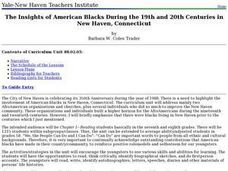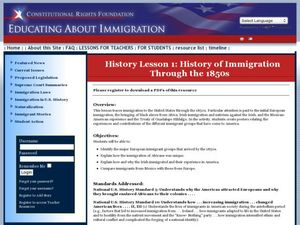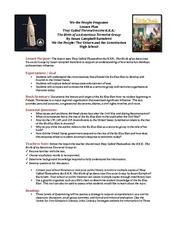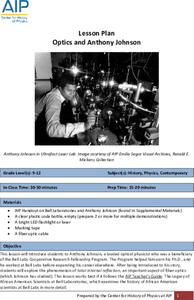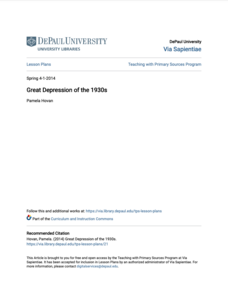National Endowment for the Humanities
Folklore in Zora Neale Hurston's Their Eyes Were Watching God
Learners define folklore, folk groups, tradition, and oral narrative. They identify traditional elements in Their Eyes Were Watching God Analyze and understand the role of traditional folkways and folk speech in the overall literary...
Curated OER
Black American Soldiers in the Civil War
Eighth graders explore the actions needed to receive the Congressional Medal of Honor. In this US History lesson, 8th graders analyze documents pertinent to the Congressional Medal of Honor. Students examine the process of...
Curated OER
The Insights of American Blacks During the 19th and 20th Centuries in New Haven, Connecticut
Learners examine the contributions of African Americans in New Haven, Connecticut in the 19th and 20th centuries. After being introduced to new vocabulary, they review the elements of autobiographies and read excerpts of African...
Curated OER
The Life and Work of Jacob Lawrence
Black History Month provides a time to talk about the accomplishments of African Americans like Jacob Lawrence.
Curated OER
Water in Alabama History
Students examine the role of water in Alabama's history. They discover the geographical regions of the state and how dams change Alabama's rivers.
Curated OER
Women's History Week
Learners investigate the contributions of women who influenced human rights in US history. They examine the influence Susan B. Anthony, Harriet Tubman, Sojourner Truth and Elizabeth Cady Stanton by participating in a jigsaw activity....
Curated OER
History of Immigration through the 1850's
Students research the history of Immigration. In this World History lesson, students explore European immigration then specifically focus on ways African Immigration was different. Students then divide into small groups and...
Curated OER
How Has African American Culture Shaped the History of Kentucky?
Eleventh graders explore the African American culture and history of Kentucky. They observe how an author's personal bias can define the argument of his/her publication. Students analyze primary source documents.
Judicial Branch of California
Separate But Equal - Is It Black or White?
The story of Ruby Bridges and the case of Brown vs. The Board of Education are fantastic tools for discussing the concept of separate but equal. Kids tackle some big questions about what is fair, what is civil, and what rights or laws...
Alabama Learning Exchange
African American Civil Rights Movement
An excellent resource defines the African-American Civil Rights Movement from the early 1900s through the legacy left in modern times. Every major date, event, and key player is described under clear overarching categories. The NAACP,...
Curated OER
Say It Loud!: A Celebration Of Black Music in America - Louis Armstrong
Students listen to selections of New Orleans street band music. They explore the culture of New Orleans in the 1920's, and perform a closer examination of Armstrong's music.
Described and Captioned Media Program
Malcolm X: Make It Plain, Part I
Malcolm X was a complicated man that few in white America understood. After sharing what they know or think they know about this civil rights leader, about nationalism and Black Nationalism, class members view a two-part documentary...
Curated OER
South Africa's Apartheid
Discuss South African apartheid, the anti-apartheid movement, and the literature and music it inspired. Slides contain images and facts about life in South Africa during apartheid, social uprisings such as Soweto, and the various...
American Institute of Physics
Dr. Gates and the Nature of the Universe
What do Russian nesting dolls have to do with physics? They make a great demonstration tool for explaining Dr. Sylvester James Gates, Jr.'s string theory to young scientists. A two-part lesson first introduces learners to Dr. Gates'...
American Institute of Physics
When Computers Wore Skirts: Katherine Johnson, Christine Darden, and the “West Computers”
Did you know that people, known as computers, performed the complex calculations that are now done by electronic computers? Three of these human computers, Katherine Johnson, Christine Darden, and Melba Roy Mouton are featured in a...
Curated OER
The Called Themselves the K.K.K.; The Birth of an American Terrorist Group
How did Ku Klux Klan develop and flourish in the US? How did the government respond to acts of terrorism conducted by the KKK following the Civil War? How does the government respond to acts of terrorism today? This resource...
American Institute of Physics
African Americans and the Manhattan Project
A lesson about the Manhattan Project will explode young physicists' understanding of the racial attitudes in the United States during and after World war II. Groups select an African American scientist or technician that worked on the...
American Institute of Physics
African Americans in Astronomy and Astrophysics
A two-part lesson focuses on the contributions to the fields of astronomy and astrophysics of two African Americans: Benjamin Banneker and Dr. George Carruthers. In part one, scholars learn about Benjamin Banneker by examining his...
American Institute of Physics
The Physicist's War: Dr. Herman Branson and the Scientific Training of African Americans during World War II
The mobilization of soldiers for World War II resulted in a worker shortage in the defense industries, especially in the fields of physics and other sciences. The Engineering, Science, and Management War Training program (ESMWT) was...
American Institute of Physics
Historical Detective: Edward Alexander Bouchet and the Washington-Du Bois Debate over African-American Education
Young scientists meet Edward Alexander Bouchet who, in 1876, was the first African American to receive a PhD in Physics. This two-part lesson first looks at the debate between Booker T. Washington and W.E.B. Du Bois about the type of...
American Institute of Physics
Optics and Anthony Johnson
Message sending has come a long way since the days of Morse code's dots and dashes. Young scientists study the research of optical physicist Anthony Johnson and his work in fiber optics, lasers, and the principle of total internal...
American Institute of Physics
Meet Four Pioneering African American Astronauts
An out-of-this-world resource introduces young scientists to four African American astronauts: Michael P. Anderson, Ronald E. McNair, Guion S. Bluford Jr., and Jeanette J. Epps. Groups read biographies of these individuals and prepare...
DocsTeach
Women of Color and the Fight for Women's Suffrage
Introduce young historians to primary source analysis with a lesson that teaches them how to use a four-step process to analyze a photograph of a 1913 Suffrage Parade. Groups practice the process and share their observations with the...
Via Sapientiae at DePaul University
The Great Depression of the 1930s
A 10-lesson unit takes young historians through a study of The Great Depression and life in the 1930s. The crash of the stock market, the Dust Bowl, unemployment, and mass migration west are all addressed through the analysis of primary...
Other popular searches
- Black History Month
- Black History Month Projects
- Black History Month Math
- Black History Month Lesson
- Black History Month Art
- Black History Projects
- Black History Month Activity
- Black History Month Rap
- Black History Activities
- Black History Lessons
- Black History Month Programs
- Black History Month Music


